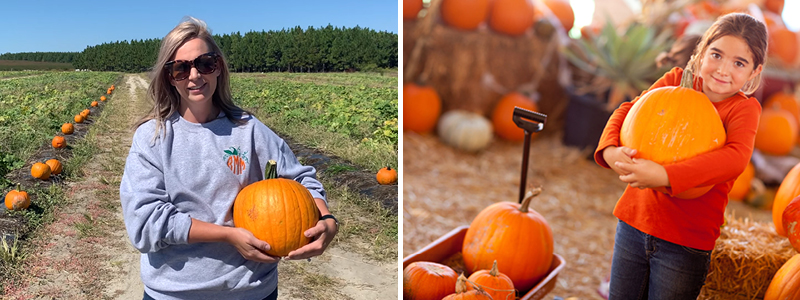During Pandemic, Agritourism Farms Get Creative

Left: A screenshot from McLeod Farms’ Virtual Pumpkin Field Trip, available at macspride.com/virtual-field-trips
Right: Denver Downs’ pumpkin patch drew people seeking outdoor fun during COVID-19. Photo courtesy Denver Downs.
During Pandemic, Agritourism Farms Get Creative
Story by Eva Moore
This story appears in the December 10, 2020 issue of the South Carolina Market Bulletin.
When the coronavirus pandemic struck the United States in early 2020, Denver Downs Farm had to cancel its annual Easter egg hunt and other spring events.
By fall, though, things had changed. With COVID-19 protocols that included masked employees, temperature checks, and a sanitation crew that cleans high-contact surfaces throughout the day, Denver Downs opened its farm for seasonal activities including a corn maze, pumpkin patch and pig races.
“This fall we were not expecting that many people to want to check out the farm,” says Catherine Davis, co-owner of Denver Downs, a century farm in Anderson. “We were very surprised and happy when people really did show up.”
In the early days of the pandemic, like nearly all businesses, agritourism farms took a hit. Schools closed, cancelling the weekday field trips that bring in revenue and young visitors to learn about farming. Some U-pick berry farms opened while others remained closed, reflecting early uncertainty about the best ways to protect against the virus. Large events were restricted by the order of the governor.
But as the pandemic wore on, South Carolinians began to seek out agritourism activities. And farms began to find ways to safely invite people onto their properties.
“I think people are realizing they can get outside,” says Jackie Moore, director of the South Carolina Agritourism Association. “I think people are finding out how much fun it is.”
Her organization is actually growing, Moore notes: “We’ve had an upswing in membership since COVID.”
Of course, things are still difficult for farmers, including those that make money off agritourism.
Old McCaskill Farm’s 2019 Fall Family Farm Day drew almost 4,000 people in one day – but this year, Kathy McCaskill felt she had to cancel both her spring and fall events.
“Even though we’re an open-air environment, 4,000 is still too many people,” notes the Rembert, SC farmer. Instead, she’s hosted some smaller events, asking for donations rather than the usual admission fee. She opens her farm store each Thursday and Friday from 10 a.m. to 6 p.m., and serves lunch on Fridays. She’s also signed up with Harvest Hosts, a website that helps people find scenic places – like farms – to park their RVs for a night.
Other farms have found ways to adapt to the online world of COVID-19. McLeod Farms, for example, created a Virtual Pumpkin Field Trip and posted it to YouTube. The video includes a walkthrough of the farm’s pumpkin patch, storytime, and a lesson on farming methods used at the farm. Schools can even order pumpkins from the farm so their students can make a hands-on connection to the virtual field trip.
Many farms have moved to online ticket sales, with some requiring timed admission to avoid crowding, says Moore. She expects online ticketing to remain an important part of agritourism even after the pandemic.
Through it all, Denver Downs’ Davis says she’s tried to adapt and keep moving.
“We try to stay positive during all this,” Davis says. “A lot of times in agriculture things are out of your control, so you stay with what you can control.”
Like what you see? Subscribe to the Market Bulletin here for just $15 a year.





